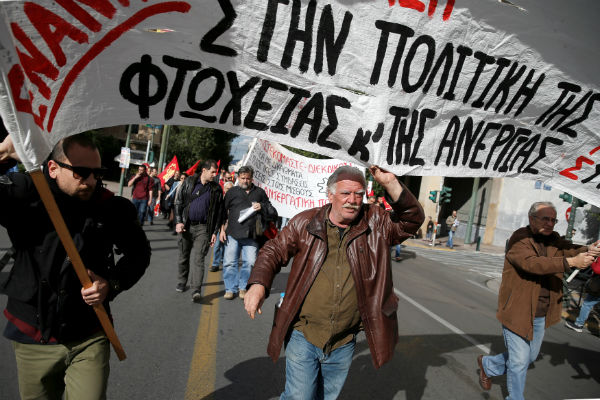Follows one-day walkout earlier in November

ATHENS (Reuters) — Public transport was disrupted and ships remained in ports as Greek workers went on strike on Wednesday, seeking increases in minimum wages and the re-introduction of collective bargaining.
Greece’s biggest private-sector union, GSEE, called the 24-hour walkout, demanding tax cuts and a rise in the minimum wage, which was slashed under the terms of the country’s three international bailouts since 2010, which ended in August.
Morning rush-hour traffic turned to frustrating bottlenecks on busy Athens avenues, with traffic crawling to a halt.
“This is the silence of the lambs,” said construction worker Christos Valentis, stuck in his van as Syngrou Avenue, one of the main thoroughfares of the capital, looked like a huge parking lot near the city’s centre.
Asked why he did not stay home, he said: “Got to get the job done, got to feed the family.”
The walkout follows a one-day strike by Greece’s main public-sector union earlier this month, which also demanded wage and pension increases, hiring and tax cuts.
Greek ships remained docked at the country’s ports as seamen joined the 24-hour strike.
Since its debt crisis began in 2009, Greece has received 260 billion euros (US$302 billion) in bailout loans. In exchange, it laid off public-sector workers, raised taxes and cut pensions as part of an austerity drive.
“The bailouts have turned job conditions in the private sector positively medieval,” said Ioannis Mariolis, 55, a telecoms worker.
“What am I supposed to do with the hard-euro currency of the Germans when I don’t have any to spend? We were much better off with the drachma,” he told Reuters.
In its first post-bailout budget for 2019, Greece said it would not implement legislated pension cuts, targeting a primary surplus target of 3.6 per cent of gross domestic product next year, in line with its commitment to control public finances.
The government of Prime Minister Alexis Tsipras, which faces elections next year, has also said it would reinstate collective bargaining and raise the minimum wage, which was cut as much as 32 per cent to about 500 euros during the crisis, for the first time since 2009.
But GSEE said that the government still would not let employees and employers determine the size of the salaries.




